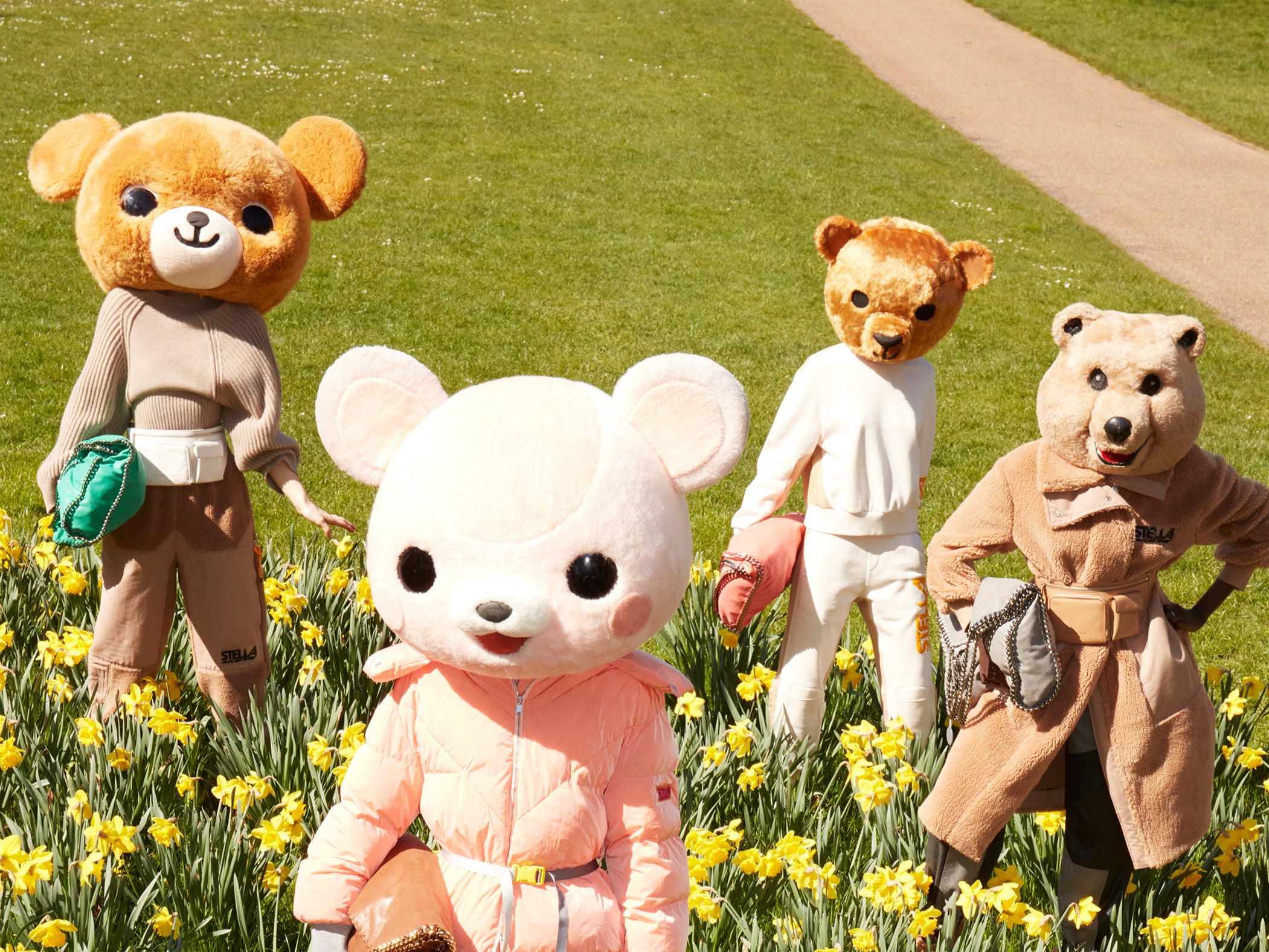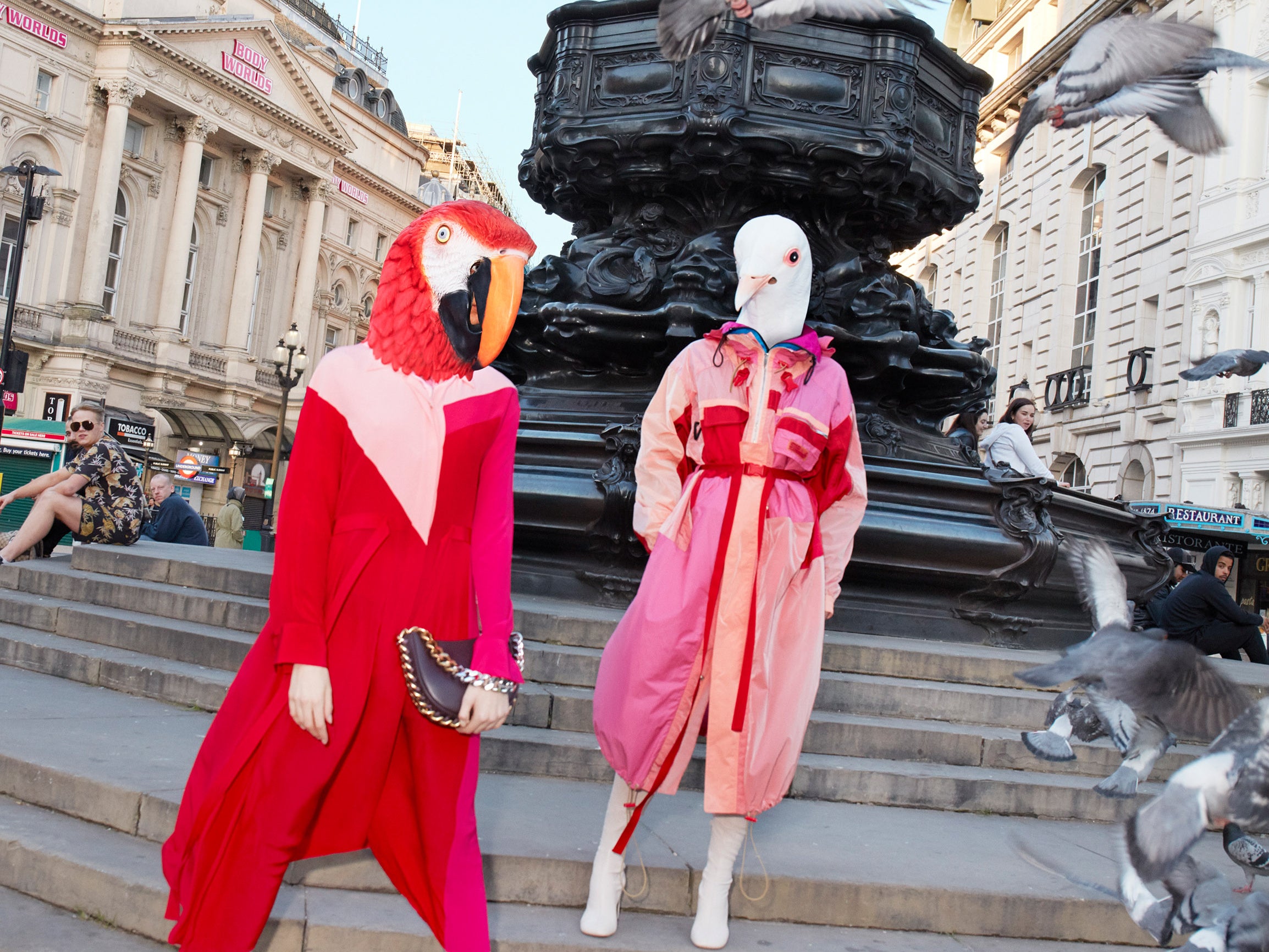‘We want to see an end’: Stella McCartney is here to remind you that importing and selling fur is still legal
The British designer’s new campaign calls for an end to the import of animal furs into the UK, but the British Fur Trade Association argues the move could do more harm than good, Saman Javed finds


Stella McCartney wants us to celebrate animals as our equals. The fashion designer, who has long been a vocal advocate for animal rights and sustainability in the fashion industry, debuted her autumn 2021 collection on Tuesday with the help of some very well dressed animals.
The creatures, photographed walking among the general public in some of London’s busiest areas, such as Trafalgar Square, Mayfair and Piccadilly Circus, were wearing the latest sweatshirts, handbags, dresses and trainers from the designer’s Our Time Has Come! collection.
The campaign, shot by fashion photographers Mert Alas and Marcus Piggott, is in the style of a National Geographic documentary, as comedian David Walliams narrates the behaviours of the rabbits, bears, wolves and birds that have descended onto central London’s streets.
Aside from being an innovative showcasing of the designer’s latest offering, the campaign is also a pledge for the general public to “help make a fur-free Britain”. Although fur farms were banned in England and Wales in 2000 - the first European country to do so - and the import of furs of endangered animals is banned (unless you have a valid permit), furs from coyotes, foxes and raccoon dogs are still legal to trade and sell.
We want to see an end to the cruel, unnecessary, outdated fur trade, and for Britain to lead the way as the world’s first fur-free nation
McCartney said: “While this campaign is light-hearted, I wanted to address a serious issue: ending the use of fur. Whether it is being sold here in the United Kingdom or farmed globally, barbarism knows no borders and this effort is key to my life’s mission of bringing a conscience to the fashion industry.”
The designer has teamed up with Humane Society International (HSI) on a petition which asks the government to establish a sales ban “to cover the pelts of all animals killed for their fur”. The petition has received more than a million signatures so far.
“The government ordered the last UK fur farm to close its doors back in 2000, but now the UK is importing fur cruelty from overseas,” the petition said.
“Opinion polls show continually high levels of public disapproval of fur, regardless of species – more than 80 per cent believe that it’s unacceptable to buy and sell animal fur in the UK.
“We want to see an end to the cruel, unnecessary, outdated fur trade, and for Britain to lead the way as the world’s first fur-free nation,” the petition added.
McCartney, the daughter of Sir Paul McCartney and late animal rights activist Linda McCartney, started her namesake brand in 2001. The brand, which has a commitment to “being kinder to Mother Earth”, does not use any materials from animals, such as leathers, feathers, skins or furs.
She was one of eight British fashion designers who wrote to Boris Johnson in March, asking for a full ban on fur sales. Other signatories included Vivienne Westwood, Katharine Hamnett, Christopher Raeburn and Helen Moore.
They argued that “despite a significant volume of fur still being legally imported into the UK, the number of retailers selling real fur continues to dwindle, as the sale of fur is simply not aligned with the ethical trajectory of the vast majority of retailers, designers and businesses that make up the British fashion retail industry”.
However, the calls to ban the import of furs have been strongly opposed by the British Fur Trade Association, which claims that sales of natural fur in the UK have increased in recent years.
Additionally, it said a UK fur ban “would increase the amount of fur coming from unregulated sources”, further damaging animal welfare standards by allowing a black market trade.

“Simply banning fur in the UK would not end the international fur sector or trade in fur-bearing animals. It would do nothing to influence standards on farms in other countries,” the association said, adding that the “UK’s voice to influence and drive up and improve animal welfare standards globally would be reduced”.
The BFTA said its own polling had shown that there is “no majority in favour of restricting fur in the UK” and that 97 per cent of British people believe that banning fur should not be a government priority.
“Sales of natural fur in the UK have increased by over 200 per cent in the last ten years, particularly among younger age groups, as environmentally conscious consumers increasingly reject the mass-produced non-renewables epitomised by the fast-fashion crisis and search out long-lasting, sustainable natural materials,” the association said.
Earlier this month, the government launched a formal “call for evidence” asking for the fashion industry and the general public to provide insight into the fur trade in the UK.
It said that now the UK’s future relationship with the EU has been established, post-Brexit, it has a unique opportunity to re-examine its animal welfare standards.
Fur farming has been banned in England and Wales since 2000, and in Scotland since 2002. The import of fur and skin from seals, cats and dogs is also prohibited.
“We already have some of the highest animal welfare standards in the world and as an independent nation we are now able to re-examine some of our animal welfare laws, including the import of fur for use in fashion products,” George Eustice, environment secretary, said.
Join our commenting forum
Join thought-provoking conversations, follow other Independent readers and see their replies
Comments